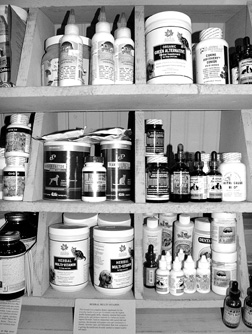By Shannon Wilkinson
Every two weeks I faithfully fill the pill organizers for my Boxer, Tyler. He receives a number of supplements, some for general nutrition and well-being, and some specific to his particular health challenges, including Addison’s disease.
I’m not the only one performing this ritual. According to the American Pet Products Manufacturers Association, about nine percent of all dogs receive vitamins regularly; perhaps an even greater percentage of WDJ readers give supplements to their canine companions.
The pet supplement market has erupted into a billion-dollar industry – yes, that’s billion with a B. There is a dizzying array of pet specific supplements available in stores, catalogs, and online, and the choices are growing all of the time. While this means there are more options available for your dog, it also means that you may have a more difficult time making the right choice.
“This is a buyer-beware industry,” says Bill Bookout, president of the National Animal Supplement Council, based in Valley Center, California. Bookout cautions, “There are responsible producers and there are opportunistic suppliers, and there’s no easy way to tell the difference.”
The National Animal Supplement Council, formed in 2001, is attempting to help consumers identify which manufacturers are the responsible ones. The NASC’s mission is to ensure the continued availability of animal supplements and to standardize quality in the industry.
To that end, the group has established quality guidelines for supplement manufacturers and has created a seal for manufacturers to include on their labels and marketing materials to signal to consumers that the company and its products meet those guidelines. The NASC’s guidelines were developed with help and input from members of the FDA’s Center for Veterinary Medicine and Association of American Feed Control Officials (AAFCO).
When choosing products for your dog, the NASC is a good place to start. “With a very few exceptions, I would avoid companies that are not members of the NASC,” advises holistic veterinarian Susan Wynn, of Acworth, Georgia. She adds, “You know these companies care about elevating the standards of the industry, doing the right thing regarding adverse events, good manufacturing practices, etc.”
Paying the annual dues doesn’t guarantee a company membership in the NASC. In fact, Bookout says that some companies have been asked to leave the organization for failure to comply with its standards. The self-regulating organization has a number of stringent requirements for its members, including:
1. The company must have a quality manual in place that provides written standard operating procedures for production process control.
2. The company must have an adverse event reporting/complaint system in place to continually monitor and evaluate products, and must report monthly to the NASC any adverse events, or confirm that there were no adverse events to report.
3. The company must follow proper label guidelines for all products, avoiding the use of statements that suggest that the product diagnoses, treats, prevents, or cures any disease.
4. The company must include any specific warning and cautionary statements recommended by the FDA’s Center for Veterinary Medicine and the NASC Scientific Advisory Committee, or any other recommendations made by the NASC Scientific Advisory Committee.
5. A company representative must attend at least one NASC meeting annually to stay abreast of industry developments.
Choose animal-specific products when available
Experts agree, the best choice for your dog is a supplement formulated specifically for dogs. “In my opinion, owners should only use animal products. These products have the correct dose listed on the label and the manufacturer bears some responsibility if something happens related to administration of the product,” says Dr. Wynn.
Bookout adds, “Animal products are formulated for animal metabolisms by people who know animals.” In addition to his position in the NASC, Bookout is the founder and president of Genesis Ltd., maker of supplements for cats and dogs under the Resources brand name.
Joan Holden and her husband Frank started making supplements specifically for animals more than 10 years ago, when there weren’t many options on the market. “We tried to use people products for our Golden Retrievers, but the dosages were off, and we couldn’t find exactly what we were looking for,” she explains. The Holdens founded Merritt Naturals, which is now called Animal Essentials after its merger with herbal products developer Animals Apawthecary.
Quality ingredients
“Cheap products are cheap for a reason,” says Bookout. For example, active ingredients, such as chondroitin, are available in widely varying levels of purity; this affects the cost of the raw ingredient. While some ingredients are available for a good value, if a product is significantly less expensive than similar items, there is probably a good reason.
Conversely, higher cost doesn’t always translate to a better product. Companies have different marketing and advertising costs, as well as distribution systems, such as only through veterinarians or specific retailers, all of which may increase or decrease the price. One way to understand the real value of a product is to compare the active ingredients per dose.
Animal Essentials uses only human-grade ingredients in its products, choosing organic and natural options when available. “We don’t add any sugars, fillers, or preservatives, nothing to entice [dogs] to eat the products,” says Holden. She adds, “If you need your dictionary to know what an ingredient is, it’s probably not necessary.”
There are a number of common inert ingredients that are used to help form the active ingredients into the proper form or consistency, such as a tablet or capsule. Called excipients, these ingredients are generally considered to be safe. However, they may be the hidden cause of allergic reactions. For example, the gelatin used to make a capsule could cause a reaction in an animal highly allergic to beef. For this reason, it may be best for some animals to choose products with the fewest ingredients possible, in a natural form, such as a powder.
Clear information on labels
The label should be clear and easy to read. It should contain a complete listing of ingredients, including the active as well as the inactive, or inert, ingredients. It should also say how much of each active ingredient is in each unit or dose, whether it’s a scoop, tablet, or dropper. This information will help you ensure that your dog will get a therapeutic dose of the active ingredient in an easy-to-administer amount. It also allows you to compare different products with similar ingredients.
Also, look for an expiration date and a lot number on the package. “A lot number shows the company is tracking the product and has an eye toward quality. If there’s a problem, without a lot number, the company can’t do a recall,” explains Bookout.
Reputable companies
Contact information should be easily found on the label. If the company isn’t a member of NASC, visit the company’s Web site. Call the company and ask about its quality program, who formulated its products, and what customer support the company provides.
Avoid overzealous marketers and products that promise miracles. Manufacturers of supplements are not allowed to make claims about a product’s ability to treat or cure disease. However, statements regarding how the supplement can impact structure or function of the body are acceptable. For example, a glucosamine/chondroitin supplement can say that it contributes to healthy joints, but it cannot say that it cures osteoarthritis.
-Shannon Wilkinson is a freelance writer, life coach, and TTouch practitioner in Portland, OR. She remembers to give her dog and cats their supplements every day, but rarely remembers to take her own vitamins.






